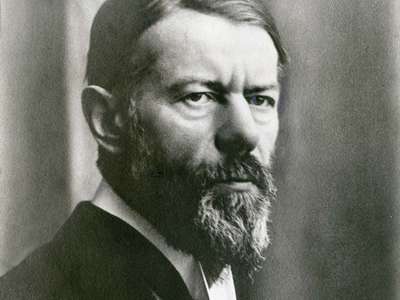Imagine a bustling city – people rushing to work, families enjoying a meal, politicians arguing over policy. Behind this seemingly chaotic symphony of human interaction, lie intricate webs of power and conflict. These invisible forces shape our social structures, influence our decisions, and even determine our destinies. This is the realm of sociology, and one of its key theories for understanding these complex dynamics is **Weber conflict theory**.

Image: sinaumedia.com
Developed by the renowned German sociologist Max Weber, this theory offers a unique lens through which to examine the various ways power is distributed and how groups clash over its control. While often compared to Marx’s conflict theory, Weber’s approach emphasizes the role of social stratification, bureaucracy, and rationalization in perpetuating social inequalities and driving conflict. Understanding its core principles is essential for navigating the complexities of the modern world and fostering a more equitable society.
The Foundations of Weber Conflict Theory
Weber’s conflict theory, unlike Marx’s, extends beyond class conflict. It recognizes that social power is not solely defined by economic resources but also by social status and political influence. This multi-dimensional approach highlights the complexity of power dynamics in a society.
Social Stratification
Weber viewed society as a hierarchical structure, differentiated by social stratification. This stratification is not limited to economic classes but encompasses factors like prestige, honor, and cultural capital. For example, a doctor may have a lower income than a successful entrepreneur but enjoys higher social prestige due to the perceived value of their profession. These distinctions, according to Weber, lead to both opportunities and limitations for individuals, driving conflict amongst different social groups.
Bureaucracy and Rationalization
Weber also recognized the role of bureaucracy in shaping social relationships and power distribution. Bureaucracy, with its strict rules, procedures, and hierarchy, can often lead to **rationalization**— a process where efficiency and predictability become prioritized over human values and individual needs. This can result in power imbalances, as bureaucrats gain control over resources and decision-making processes, while individuals become cogs in a larger machine.
:max_bytes(150000):strip_icc()/TC_3026622-conflict-theory-5ad63b75a474be0036ab1069.png)
Image: freeonlineresearchpapers.com
Power, Authority, and Legitimacy
Weber further distinguished between “power” and “authority”. Power is the ability to impose one’s will on others, while authority is legitimate power, accepted by those it governs. He identified three types of authority:
- Traditional Authority: Based on custom, tradition, and the established way of doing things. Think of a hereditary monarchy.
- Charismatic Authority: Based on the extraordinary qualities and personal magnetism of an individual leader. Examples include political revolutionaries or religious prophets.
- Legal-Rational Authority: Based on impersonal rules and procedures, usually found in modern bureaucratic institutions like governments and corporations.
Applications of Weber Conflict Theory in the Modern World
Weber’s theory continues to offer valuable insights into understanding social conflicts in today’s world.
Social Movements and Activism
Social movements often emerge as a response to perceived inequalities and injustices. Weber’s theory helps explain how different groups, driven by shared grievances and aspirations for change, organize to challenge existing power structures. For example, the Civil Rights Movement, using tactics like boycotts, marches, and legal challenges, aimed to dismantle racist structures and secure equal rights for African Americans.
Corporate Power and Inequality
In the contemporary world, corporations wield significant economic and political power. Weber’s theory sheds light on how corporations, driven by profit maximization and efficiency, can have a profound impact on social life. The rise of multinational corporations, with their vast resources, influence over governments, and potential for exploitation, raises concerns about growing economic disparities and inequality.
Political Polarization and Conflict
Weber’s insights into social stratification and rationalization help explain the increasing polarization within societies. The growing divide between elite groups, often wielding significant economic and political power, and less privileged groups with limited resources, can lead to political clashes and social unrest. This dynamic is further amplified by the rise of social media platforms, which can contribute to the spread of misinformation and the formation of echo chambers, deepening existing rifts.
Critiques and Debates
While influential, Weber’s conflict theory is not without its critics. Some argue that it oversimplifies the complex factors contributing to social conflict, giving insufficient attention to cultural dynamics and individual agency. Others contend that his emphasis on rationalization may underestimate the power of tradition and emotion in shaping social interactions and power struggles.
Despite these criticisms, Weber’s theory remains a valuable tool for understanding how power structures impact individuals, groups, and societies as a whole. By examining the interplay of social stratification, bureaucracy, and legitimacy, we can better grasp the underlying dynamics of social conflict and work towards fostering a more just and equitable world.
Weber Conflict Theory
Conclusion
Weber’s conflict theory provides a framework for analyzing the complex interplay of power, social stratification, and conflict in our societies. It highlights the importance of understanding the multiple dimensions of power, the role of bureaucracies in shaping our lives, and the potential for conflict to arise from these dynamics. By embracing this theory’s insights, we can gain a deeper understanding of the social forces at play, become more informed citizens, and contribute to the creation of a more just and equitable society.






